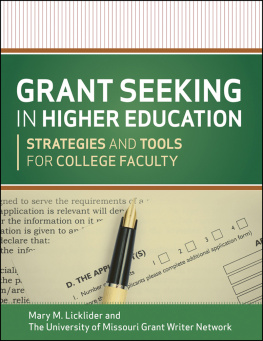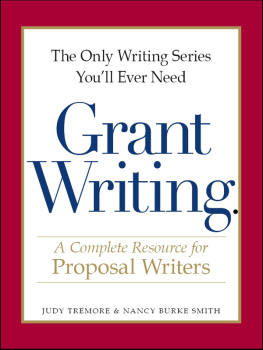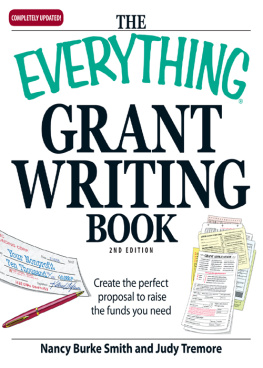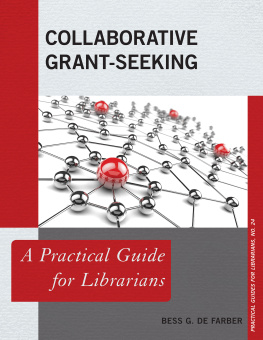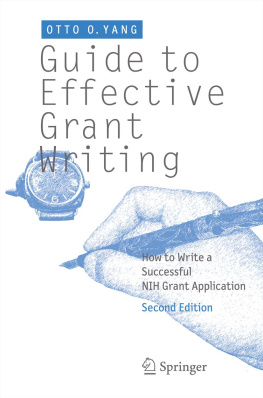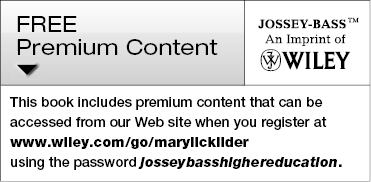
Copyright 2012 by John Wiley & Sons, Inc. All rights reserved.
Published by Jossey-Bass
A Wiley Imprint
One Montgomery Street, Suite 1200, San Francisco, CA 94104-4594www.josseybass.com
No part of this publication may be reproduced, stored in a retrieval system, or transmitted in any form or by any means, electronic, mechanical, photocopying, recording, scanning, or otherwise, except as permitted under Section 107 or 108 of the 1976 United States Copyright Act, without either the prior written permission of the publisher, or authorization through payment of the appropriate per-copy fee to the Copyright Clearance Center, Inc., 222 Rosewood Drive, Danvers, MA 01923, 978-750-8400, fax 978-646-8600, or on the Web at www.copyright.com. Requests to the publisher for permission should be addressed to the Permissions Department, John Wiley & Sons, Inc., 111 River Street, Hoboken, NJ 07030, 201-748-6011, fax 201-748-6008, or online at www.wiley.com/go/permissions.
Limit of Liability/Disclaimer of Warranty: While the publisher and authors have used their best efforts in preparing this book, they make no representations or warranties with respect to the accuracy or completeness of the contents of this book and specifically disclaim any implied warranties of merchantability or fitness for a particular purpose. No warranty may be created or extended by sales representatives or written sales materials. The advice and strategies contained herein may not be suitable for your situation. You should consult with a professional where appropriate. Neither the publisher nor author shall be liable for any loss of profit or any other commercial damages, including but not limited to special, incidental, consequential, or other damages. Readers should be aware that Internet Web sites offered as citations and/or sources for further information may have changed or disappeared between the time this was written and when it is read.
Jossey-Bass books and products are available through most bookstores. To contact Jossey-Bass directly call our Customer Care Department within the U.S. at 800-956-7739, outside the U.S. at 317-572-3986, or fax 317-572-4002.
Wiley also publishes its books in a variety of electronic formats and by print-on-demand. Some material included with standard print versions of this book may not be included in e-books or in print-on-demand. If the version of this book that you purchased references media such as a CD or a DVD that was not included in your purchase, you may download this material at http://booksupport.wiley.com. For more information about Wiley products, visit www.wiley.com.
Library of Congress Cataloging-in-Publication Data
Licklider, Mary M.
Grant seeking in higher education : strategies and tools for college faculty / Mary M. Licklider and The University of Missouri Grant Writer Network ; foreword by David Attis.
p. cm. (The Jossey-Bass higher and adult education Series)
Includes bibliographical references and index.
ISBN 978-1-118-19247-4 (pbk.)
ISBN 978-1-118-39511-0 (pdf) ISBN 978-1-118-39512-7 (epub) 978-1-118-47645-1 (emobi)
1. Educational fund raisingUnited States. 2. Education, HigherUnited StatesFinance. 3. Research grantsHandbooks, manuals, etc. 4. Proposal writing for grantsHandbooks, manuals, etc. 5. Universities and collegesFaculty. I. Title.
LB2336.L54 2012
378.1'06dc23
2012016932
The Jossey-Bass Higher and
Adult Education Series
List of Figures, Tables, and Boxes
Figures
: Grant-Seeking Career Strategies
: Traditional and Strategic Approaches to Collaboration
: Elements of Successful Collaboration
: Collaborative Relationships
: Proposal Logic
: TICIPS Projected Timeline
: Quarterly Timeline
: Protocol Timeline for Project 1
: Management Plan and Project Timeline
: Shifting Paradigms
: Grants Culture across the Disciplines
Tables
: US Giving by Type of Recipient Organization
: Writing Productivity and Efficiency under Three Conditions
: Personnel Effort Summary Table
: Budget Justification Summary Table
: Participant Table
: Grant Glossary
: Deal or No Deal?
: Proposal Development Tasks Discussion Checklist
: Timeline for Proposal Development: National Science Foundation
: Proposal Timeline: Engineering Information Foundation
: Materials Tracking Table
: Total Personnel Costs
: Total Fringe Benefits Costs
: Total Equipment Costs
: Total Travel Costs
: Total Materials and Supplies Costs
: Total Subcontract Costs
: Total Other Direct Costs
: Total F&A Costs
: Total Project Costs
: Timeline for Training, Coaching, and Buddy Network
: Research Timeline
: Curriculum Development Timeline
: Skills Inventory: Essential Categories of Practices
: Sample Performance Assessment
Boxes
Foreword
I FIRST ENCOUNTERED Dr. Mary Licklider and her team of grant writers at the University of Missouri (MU) while researching a report on best practices in supporting large-scale multidisciplinary research. One of the challenges I heard in talking to dozens of institutions was that proposals for large collaborative grants were so labor-intensive and complicated that few faculty investigators had the time or the experience to complete them. The MU Grant Writer Network had solved this problem by distributing expert grant writers throughout the university and connecting them through the central Office of Grant Writing and Publications. The results were impressive. Prior to the launch of the network in 1998, MU had won only three large-scale multidisciplinary grants. Since then, it has won more than 25a result of the quality of research taking place on campus and the unprecedented support provided by its network of professional grant writers. The Network has grown from one individual in 1998 to 18 individuals today. Network grant writers have been involved in over $1.8 billion in proposals and over $304 million in awards.
Not every institution or every faculty member has access to an established group of effective grant writers, and that is where this book comes in. Mary and her team have distilled the lessons learned over more than a decade of grant writing into a comprehensive handbook. Whether you are at a community college, a liberal arts college, a masters university, or a major research university, you will find helpful advice in this book. Anyone in higher education looking for fundingfrom foundations, state agencies, or federal agencies; in the sciences, humanities, or social scienceswill learn something valuable from this resource.
The book covers the proposal process from start to finish, with advice ranging from the strategic (how to decide if an opportunity is worth the effort it will take to apply, how to think about funding at different career stages) to the mundane (how to set up e-mail alerts with opportunities from specific agencies, how to set the line spacing in a proposal). Readers get advice on each component of the proposalcover letters, abstracts, budgets, budget justificationsincluding sample text, case studies, and common mistakes. There are even sections on managing the project, including HR, finance, and data management.
A key message of the book is the importance of knowing your audience. Not only do the authors provide detailed descriptions of the grant-making process at different agencies and foundations, they also provide first-person accounts from reviewers and program directors explaining what they look for, how they read, and the fastest ways to lose their interest. The book explains the most common reasons that funders reject proposals, when to resubmit, and when not to.
Next page
